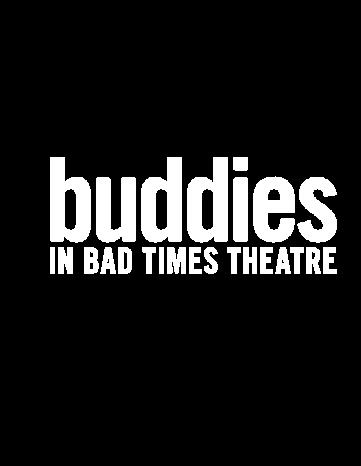BUDDIES IN BAD TIMES THEATRE
ANNUAL REPORT


BUDDIES IN BAD TIMES THEATRE
ANNUAL REPORT

Established in 1979, Buddies in Bad Times Theatre is Toronto’s leading destination for artistically rigorous alternative theatre and a world leader in developing queer voices and stories for the stage. Buddies offers a year-round program that includes a full season of queer theatre, new works festivals, artist residencies, and intergenerational training and education initiatives. In its 44-year history, Buddies has welcomed more than a million people into its home in the heart of Toronto’s queer village and has premiered more than 1,000 new works for the stage, making it the largest and longest-running queer theatre company in the world.
Buddies in Bad Times Theatre is situated on the traditional lands of the Haudenosaunee, the Anishinaabe, and the Wendat, and the treaty territory of the Mississaugas of the Credit. We acknowledge them and any other Nations who care for the land (acknowledged and unacknowledged, recorded and unrecorded) as the past, present, and future caretakers of this land, referred to as Tkaronto (“Where the Trees Meet the Water”; “The Gathering Place”). Buddies is honoured to be a home for queer, trans, and 2-Spirit artists on these storied and sacred lands that have been stewarded by Indigenous Peoples for thousands of years before the arrival of colonial settlers.
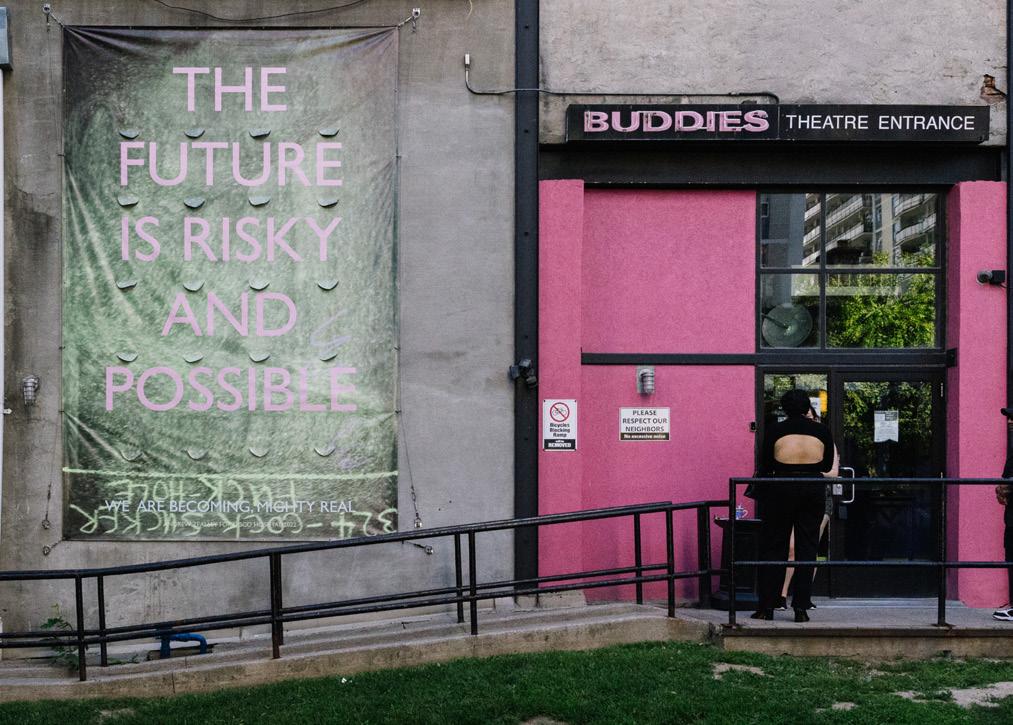
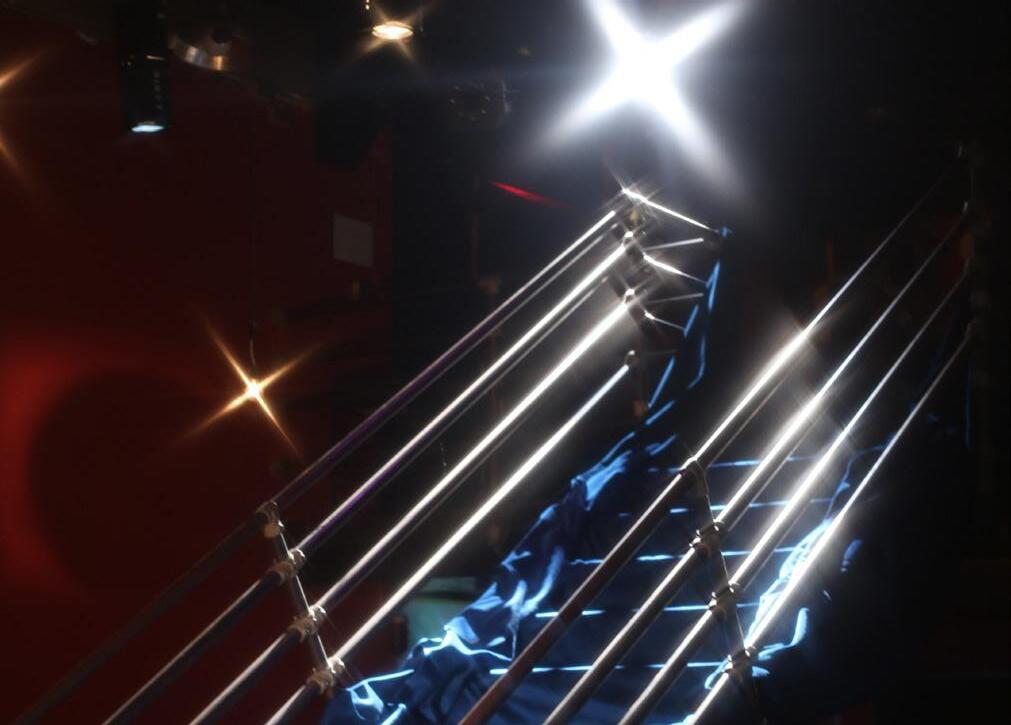
Welcome back to Buddies!
10,265 people attended performances in person and online
256 people attended our community and educational programming
$400,000 disbursed to artists
Reopening our theatre to inperson performances and seeing our home at 12 Alexander Street reactivated and filled with our queer communities again was truly revitalizing. At the same time, I was in awe of the ingenuity of artists who transformed and adapted their work for our hybrid season, which connected Buddies to audiences across Canada and around the world.
This successful return to sharing space would not have been possible without the commitment of queer artists, a devoted staff, and our community of donors and funders who continued to invest in the future of queer artists, queer performance, and queer community.
300+ hours of space given to residency artists
This commitment has been tremendously meaningful, as the recovery of our sector will take time. COVID-19 has had a major impact on audience development, production costs, and fundraising. Your contributions to this vital organization will support us, as a company and a sector, in navigating this new period of time as we deal with the effects of a global pandemic and build upon the 44-year history of this legendary company.
In the following pages, you can read about some of the successes achieved over the previous season: the reactivation of Tallulah’s Cabaret with a series of in-person and broadcasted cabarets, drag performances, comedy nights, and live music; a national conference on queer performance bringing together
over 50 queer artists from across Canada to interrogate notions of the queer monolith; and, the reopening of our doors to the public to present two festivals and premiere two new works from our Residency Program.
As we near our 45th anniversary, we continue working towards better practices and building upon changework already implemented, including: introducing cost-of-living adjustments for management contracts; extending production timelines to improve work-life balance; developing a new rental intake process and structure that has already shown a 200% increase in rental revenue; and, revising working policies, with more transformation underway. In the year ahead, we will endeavour to grow new and old partnerships, expand our community of donors and sponsors, and build a company structure that best supports queer artists in Toronto and beyond.
This is a very exciting time for our company as we rebuild our leadership team, and I am so grateful for the amazing work of our staff, board and season artists who have all stepped up in big ways this past year; and, of course, for your steadfast support of this legendary queer theatre.
With love,
Daniel Carter Managing Director/ Interim Director of Programming and OperationsEach year of this pandemic has brought new and evolving challenges. From shutdowns, to digital seasons, to fighting for equity and accessibility in theatre and our community, to reopenings, to more shutdowns, and more reopenings – it’s been a rollercoaster. Through it all, the community of Buddies has showed off the resilience that made us the largest and longestrunning Queer theatre in the world.
We’ve been extremely busy. Along with a season full of extraordinary artists and community events, we have built a revitalized board that has dedicated itself to ensuring the longevity of the company into the future, overhauled our financial accounting systems, have continued a project that is examining how institutional harm can be addressed through community process, and hired Helen Yung from the Laboratory for Artistic Intelligence to help guide our ongoing efforts of organizational transformation.
In truth, it’s been a lot of unglamorous, behind-the-scenes work to ensure that the artists on our stages and the community in our audiences continue to have this incredible space that allows us to dream up our collective queer future.
It has been almost a year since I stepped in as the Chair of the Board, and becoming a part of this company has been a true honour. In getting to know everyone connected to the company, I’ve been struck by how much care and consideration there is here. No one I’ve met has taken
the incredible resource of this theatre and what it means to our community, for granted. This company has been stewarded by devoted staff, artists, and community that have committed to making the organization stronger and more sustainable, engaging in the why and how we make performance in the queer community. And I would be remiss not to shout out the astonishing and undaunted leadership of Daniel Carter guiding this whole ship with a steady hand. Truly, I have no words to express my gratitude for his work and dedication.
There is still lots of work to do, but for now, I just want to take a moment to appreciate how far we’ve come.
It is with great PRIDE that I count myself amongst the community that sustains this theatre company. I am proud to have been a part of the hard work put in this past year to ensure Buddies, one of the greatest natural resources of Toronto’s Queer community, will grow stronger, and sexier with age.
Stay strong, stay proud, stay sexy, Buddies!
Brendan McMurtry-Howlett Board Chair Buddies in Bad Times Theatre580 artists and designers were employed by Buddies
59% of the lead artists creating work in our season were women
71% of the lead artists creating work in our season were people of colour
75% of the lead artists creating work in our season were trans or non-binary
How did you get connected with Buddies?
Even when opportunities for in-person work were limited, Buddies continued to provide provocative and engaging programming. Taking advantage of the flexibility of digital presentation, we engaged queer and trans artists from across Ontario, Alberta, and Manitoba. Audiences around the world had access to the work we programmed, including a presentation—in a Google doc—of We Quit Theatre’s 8054821. And of course, we got to entertain local audiences hungry for scintillating live performance, with our intimate Live at Tallulah’s series.
How did We Quit Theatre come together as a collective?
We both did Fringe shows in like 2016 that were about obsessive compulsive disorder and became mutual fans. We were both excited to find someone else who loved and hated ‘the theatre’ and gender as much as we did.
What was the inspiration behind 805-4821?
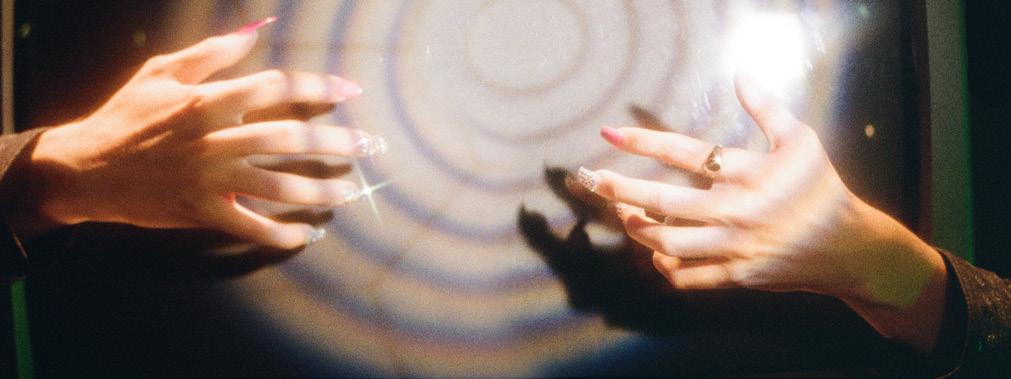
Funnily enough, a lot of 805-4821 is an attempt to trace the history of its shifting inspirations! The early drafts were supposedly about ‘masculinity’ and ‘pain’ but as the writing went on it became clear that there was something more and other going on, and now here I am, a very smug transsexual.
A million years ago I remember soft-pitching a version of 805-4821 to Rhubarb and was politely rejected… fast forward and I think Daniel reached out to us to see if we’d be interested in bringing the digital version of the show that we’d been touring through the pandemic to Buddies. The live version of the show that was at SummerWorks in 2018 also received the Buddies in Bad Times Vanguard Award, which was really affirming of what we were doing.
What were some of the challenges and opportunities of moving from an in-person to virtual format due to the pandemic? Are you holding onto any of these as things shift largely back to in-person?
Absolutely. As a company we learned so many skills (we did a multi-camera livestream of our new show I am your spaniel, or, A Midsummer Night’s Dream by William Shakespeare by Gislina Patterson in Gislina’s
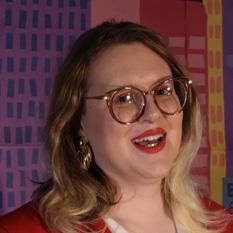
living room) that we want to keep using. We feel really passionate and committed to the accessibility of our work, and feel that the so declared “end” of the pandemic is premature, cruel, and dangerous to immunocompromised and disabled artists and communities. We also felt like having a strong online component to our work allowed us to connect with so many people we never would have otherwise.
As a collective based in Manitoba, what was it like connecting with Buddies and Toronto audiences?
So fantastic. When we did the show at SummerWorks we had very small audience sizes and sold out the run, and heard from lots of people that they’d wished they could see the show. So it was fun to bring it back to Toronto, but also to all of Buddies’ international followers and fans. During the Buddies run we had a bunch of people from New Zealand tune in for what was (for them) a dawn showing.
What’s next for 805-4821 and We Quit Theatre?
Well, right now we are putting together a chapbook of improvised erotic retellings of classic Bible stories, workshopping a live version of our project Men Explain Things to Us… And We Like It!, doing a new round of dramaturgy on i am your spaniel, aaaaand uh, writing a musical???! Right now we don’t have any further touring plans for 805-4821, though we recently recorded a creators’ commentary for the videocan project that will be going live sometime next year. It was really helpful and fun to have the opportunity to reflect on what we’ve learned from the process of creating, recreating, and touring 805-4821, and also like closing a chapter—and opening a new one.
ARE
The Queer, Far, Wherever You Are series ran between October and July, with two audio pieces, one digital presentation, and a series of hybrid events in the cabaret.
805-4821 by We Quit Theatre
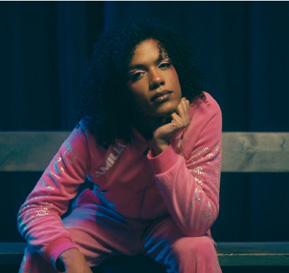
LIVE @ TALLULAH’S
Wicked West in Spooky Times
#ClownsKillEmpires: In the Flesh
Les Femmes Fatales: Lilith and the Otherwordly Creatures
GAY AF: Homo Say What?

MANifesto: Debut-taunted
THE HOOVES BELONGED TO THE DEER by Makram Ayache
TRANS GEMMES: DADDY LET THE GIRLS OUT (ORAL EDITION) directed by Bilal Baig


Tell us a bit about Q2Q-2.
In collaboration with the frank theatre company in Vancouver, Buddies facilitated national conversations about queer performance with 2021’s Q2Q-2 Conference. The weeklong digital exchange was curated by Makram Ayache, whose play The Hooves Belonged to the Deer, was recorded as an audio play as part of our Queer, Far, Wherever You Are series. It makes its mainstage debut at Tarragon Theatre this spring.
How did you first get connected with Buddies?
During my undergrad in Alberta, I started an ad-hoc 2SLGBTQ+ theatre company called “In Arms Theatre Collective.” As I built the company, I read a lot about the history and the structure of Buddies—it was a strong model for organizing politically and artistically like-minded artists. When I moved to Toronto, I first participated in Buddies’ community programming with their Youth/Elders Project in 2018. In 2019, I did a 20-minute showing of my show The Green Line for The Rhubarb Festival. I’ve been invested and involved in the growth and care of Buddies since then.
Q2Q-2 was the second iteration of a national queer theatre conference that brought together enterprising 2-Spirit, Lesbian, Gay, Bisexual, Trans, Queer+ theatre and performance artists for a series of roundtables, performances, and social events. The initial vision was to have Q2Q-2 take place at Buddies and bring in artists from across so-called Canada to join us in person. However, as the pandemic thundered down over and over and over again, we ultimately shifted toward a digital gathering. As with all things digital, that presented some challenges and many opportunities. Ultimately, it was a week-long gathering full of robust roundtables, some excellent performance and cabaret nights, and a hilarious 8-bit social gathering space!
What was your vision and process for organizing the conference?
Organizing a nationwide conference is challenging in making sure the voices that
need to be heard are most heard. There are many incredible 2SLGBTQ+ theatre artists working across the nation, and to distill it down to about 200 participants was only a matter of budget. However, I had the counsel of a robust advisory committee made up of some of the leading queer and trans theatre and performance artists who supported in the creation and execution of the conference. What we wanted to challenge with this iteration was the notion of a queer monolith - so the theme we worked with was “Resisting a Queer Monolith.”
What were some key takeaways from the process and the events themselves?
Working with an advisory committee of the scale and commitment of Q2Q-2 was an astounding way of bringing together a large scale conference. It took a lot of conversations, a lot of listening, and a lot of compromise— but it was all achieved quite effectively. Most of my learning took place from the roundtable conversations that were created by the advisory committee members. We had conversations that ranged from queer and trans newcomers, to the ideas of queer joy and comedy, to the works of Ghanaian and Indigenous and 2-Spirit artists. There is sometimes a feeling that all queer resistance emanates out of a metropolitan centre, like Toronto and Vancouver, and goes into the different regions - but what this conference embraced was the opportunity to learn and grow from the margins. There is much community and artistic organizing that can be learned from the leadership of 2-Spirit performance artists living in reservations or the
queer and trans newcomers living in the prairies. Resisting a queer monolith is a neverending conversation - but to recognize and hold space for the range of queer and trans experiences and artistry that is taking place in our concentric and overlapping communities is truly the necessary work toward genuine liberation.
What inspired the creation of The Hooves Belonged to the Deer?
“The Hooves” started as an audio play endeavour for the Alberta Queer Calendar Project (planned before the pandemic). I wanted to explore a formative relationship in my life - that to an old Christian Youth Pastor who was the first person I ever came out to. The contradictory nature of the relationship between a young, queer, sort-of-Muslim boy and a middle aged prostelytizing youth pastor became a strong source of exploration. The play is largely a fictional account of this relationship: Izzy, the main protagonist, ultimately has a very different experience than I do. However, the emotional truth of the play is consistent with my own experience; I’m attempting to look at the dangerous consequences of religious conversion, the intense attack on Islam in the spiritual domain of the West, and violence against queer people. All the while, I am really asking, what is the line between social justice and a lust for revenge?
How did the audio-piece version help in the development of the play?
The project was ideal in all dimensions. In a moment where theatre was on hiatus and a seven cast play could not have
a staging or workshopping opportunity in person, an audioplay was a saving grace. The play developed tremendously with the support of Buddies and the audioplay that was released is something I feel very proud about. The audio play solidified much of the world building, the pacing, the momentum, the rhythm, and the narrative arcs that are needed for us to go into rehearsal with confidence at Tarragon this spring.
What were some of the challenges and opportunities of working with artists across a geographic spread?
The most exciting part of working over the internet was that we could collaborate with artists from anywhere. When we recorded the Buddies audioplay, we had artists in Edmonton, Calgary, Toronto, and LA coming together to create the work. It is an opportunity that is so rare and the preciousness of it was reflected in the great work and commitment the artists brought into the project. However, as we’ve all learned, ZOOM can be fatiguing and frustrating. In all the ways ZOOM is painful, we unfortunately experienced those too. And to try and perform and record with a clarity of reaction was an absolute challenge. I give huge credit to the artists for pulling it off, but also an important credit for Chris Pereira, the sound designer, who stunningly wove the recordings together. In May 2022, we had our first in-studio workshop, and it was a striking success. So much of that bottled up digital energy was released!
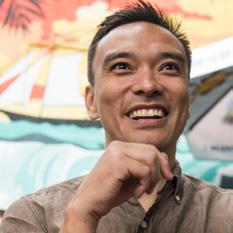
Buddies has a long history of supporting new queer works, and as we began to gather in person once again we looked for opportunities to expand that support. The new Seeding Work initiative—a throwback to the Seed Plays, an artistic development series from the 80s— provides space and resources for artists to experiment with burgeoning ideas and questions in their practice and to open up new pathways in a project’s development.
Throughout the year, our residency artists also continued to push forward in a period of artistic reflection and experimentation, while we waited to welcome an audience back to the space.
How did you get connected with the Seeding Work program?
I learned about Seeding Work in conversation with Daniel. I had recently presented a work entitled Cruising as one of the Analogue Projects Celebrating Pride in Place in 2020. Soon after the completion of this project, Daniel and I engaged in conversation about the reignition of the Seeding Work program.
Tell us a bit about your project, Sephronia.
Sephronia is a multi-disciplinary, collaborative performance work created by Anika Johnson, Indrit Kasapi, and Michael Caldwell, which unpacks personal and family history, to infuse
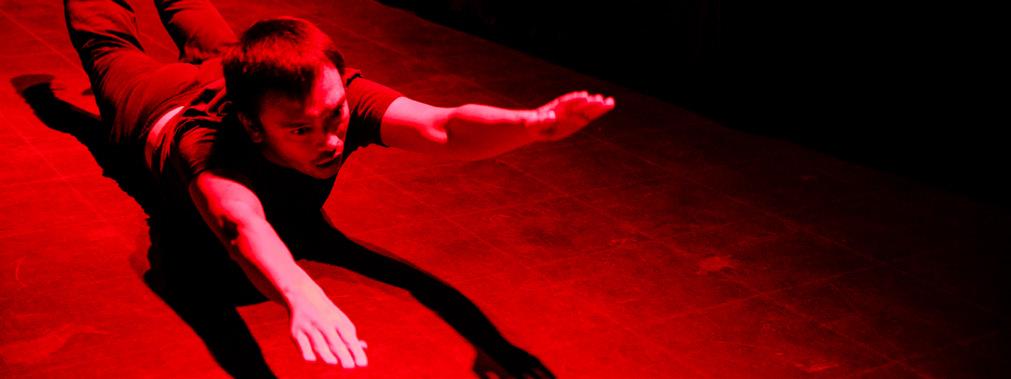
storytelling and narrative into the cabaret form, with an irreverent examination of sexuality, gender and race. It’s a full-length work of text, song and dance that plays between the imagined and the autobiographical, to ultimately question the notion of happiness.
What has been the journey of your project and how did Seeding Work fit into that?
Since our Seeding Work residency in fall 2021, we’ve applied for additional funding to move the work forward, into more research and creation, and a longterm plan for production and presentation. Anika, Indrit, and I were invited to join the Banff Playwrights Lab in April 2022, in which we further developed the text, script, and song. Our time at Buddies was a culminating moment for us. It gave us a moment to coalesce our ideas into a focused research time/space, and it was a kickstart for our current momentum.
As you are primarily a choreographer/dancer, what has the process of exploring a new medium been like?
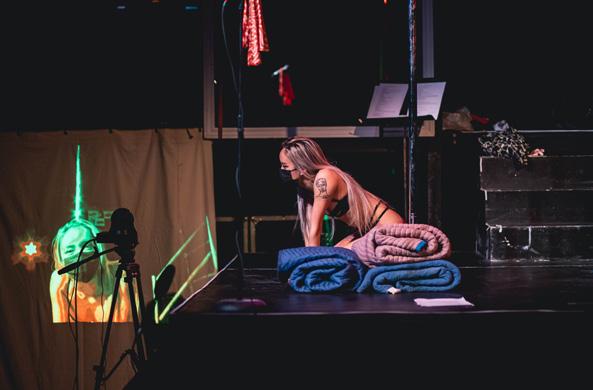
This work pushed me. Indrit pushed me to open my heart and my mind… a process that I felt ready, yet scared, to do. Anika encapsulated my words into a brilliant collection of original songs. I confronted my fear of singing in public, and I’m not sure that I feel any more confident about it… but I did it. As a choreographer and dancer, this specific process was

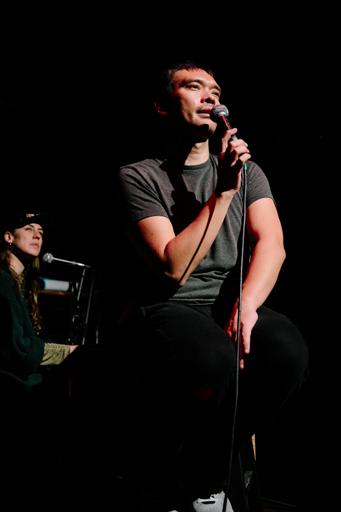
a unique challenge for me. My artistic practice often integrates voice and text with movement, though certainly not to this full-on extent! We invited a small audience to view our draft and offer feedback, and I’m so grateful.
How has being a part of the Seeding Work program influenced your artistic practice and next steps for the project?
Seeding Work opened the door for me to focus on working even more collaboratively than before. It offered an opportunity to align my working values with artistic content. I was able to more confidently acknowledge the complexity of my conflicting identities, as a cis, mixed-race, Southeast Asian, gay/queer man.
2021-22 RESIDENCY ARTISTS
Bilal Baig
Martin Julien
Pencil Kit Productions
Heath V. Salazar
We Other Sons
Collective
2021-22 SEEDING WORK ARTISTS
Michael Caldwell
Kitoko Mai
Julie Phan 潘家雯
Festival Director Clayton Lee continued to reimagine the shape and form of Rhubarb this past year. Artists were invited to a ‘bacterial residency,’ engaging with an installation, Calculus of an Infinite Rot, part 1, by Andrea Shin Ling.
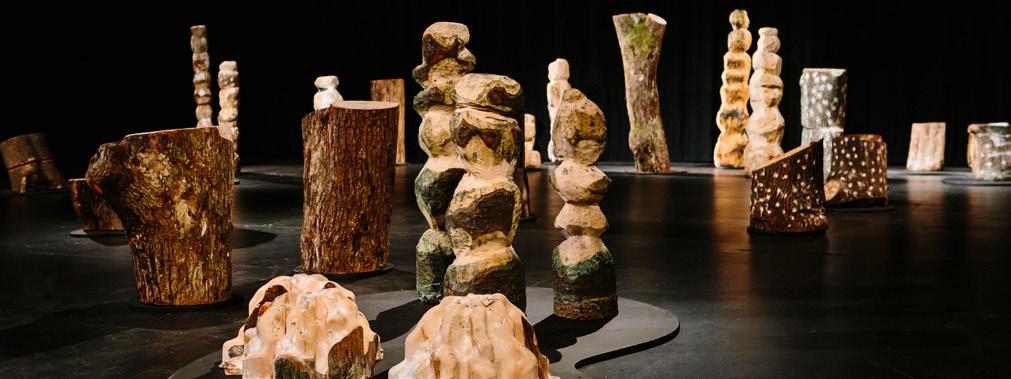
With an eye turned toward taking Rhubarb’s quintessential experimentation global, Clayton also began assembling an international network of live art festivals to foster an exchange of performance, curation, and dialogue.
How did you first learn about Buddies?
I first learned about Buddies while I was a high school student at the Triangle Program back in 2002. I remember showing a short film I made under Melissa Levin’s mentorship later that summer during Pride as part of a SOY/Buddies youth showcase. I also remember attending Pride Prom in the cabaret in 2003 dressed up as David Bowie, with Sky Gilbert as Jane emceeing.

You’ve been around Buddies in a variety of capacities. Tell us a bit about your relationship with the theatre.
Shortly after doing Rhubarb in 2015 with my Hamlet in a Hot Tub crew (David Bateman, Amy J Lester, Raymond Helkio, Stewart
Borden, and Paul Bellini), I asked my friend, longtime Buddies bartender Charlee Boyes, if Buddies was hiring. I lucked out and got a job working late night box office for club nights and I have been doing that pretty much ever since. I was also involved in the beginning stages of the Youth/Elders Project and struck up some long term friendships with Leelee Oluwatoyosi Eko Davis, Monica Garrido, Jord Camp, Ty Sloane, Daniel Carter, Usman Khan, leZlie lee kam, Russell Powell, and Brian Cope.
After applying multiple times, I was accepted into the Emerging Creators Unit under Catherine Hernandez’s direction in 2019 and worked with Ann Powell on an object theatre show. In the same year, I became one of Mel Hague’s artistic interns with Natalie Liconti for the Rhubarb Festival. And then a bunch of poetry cabarets and projects organized by David Bateman and Patricia Wilson. This is all to say that Buddies has not only been instrumental in helping me build community and my arts practice, it’s the longest I’ve ever stayed with a job. I think it’s because it isn’t just a job, it’s home.
Could you tell us a bit about your Rhubarb project, The Rats of Woolpit and why (if) Rhubarb seemed like a good home for it?
It wasn’t so much that Rhubarb seemed like a good home for The Rats of Woolpit, it was that Rhubarb felt like a good home for Esther Splett and I to tap more into ourselves as artists. If it wasn’t for 2019’s Rhubarb, I’m not sure if Esther and I would have met, let alone started making work together. Clayton rejected our first idea, feeling that we are trying too hard to be something we are not. So The Rats of Woolpit was the result of us not trying to get into Rhubarb that year (we were already in), but us actually responding to Andrea Shin Ling’s prompt that rot and regeneration are paired processes: our alien rats attempt to make a home and meaning in the human realm via their physical and cultural detritus.
What was the creation process like for you considering the challenges and opportunities the pandemic brought?
The pandemic and zoom made it possible for us to work with NYC-based puppeteer Kalan Sherrard on Keioui Keijaun Thomas’s recommendation. It also gave us the opportunity of
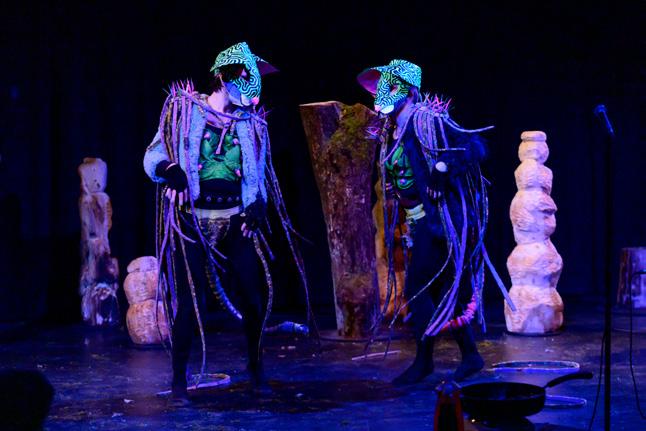
a slower pace and less jammed up quarters to spread out and make filth without spreading it to anyone. We definitely had fun letting the precautions enable our process. We made pungent onion concoctions that could pierce through audience members’ facemasks and we made papier mâché rat masks that we could use to conceal our own KN95s. We also asked audience members to contribute writing for an open mic eulogy without having to share a mic with anyone.
This fall you had the chance to bring the show to BUZZCUT in Glasgow. What was that opportunity like?
It was super exciting! Other than performing in Peterborough or Kitchener-Waterloo, I had never been asked to perform outside of Toronto, let alone outside of North America. The BUZZCUT artists and producers were super lovely. The night before Esther and I were going to perform at Double Thrills, I was a bit nervous. I remember Karl Taylor (BUZZCUT’s administrative director) easing my worries by saying that although Esther and I are international artists, the stakes aren’t as high as they were feeling at the moment. He explained that BUZZCUT’s
core is very much the same as Rhubarb’s core: communityminded, rough around the edges, messy, weird, and brilliant with bittersweet dollops of failure on top.
How has working with Buddies and Rhubarb influenced your artistic practice?
I honestly don’t think I’d be the kind of artist I am today if it wasn’t for Rhubarb or Buddies. Rhubarb has excited, educated, healed, and challenged me creatively and politically in ways my study of queer theory at U of T for 11 years could only ever gesture towards. I also had long thought that when I didn’t get the part of Winthrop Paroo in the Music Man at age 11 my theatre career was over. And it was for 19 years until I did Hamlet in a Hot Tub in 2015.
What’s next for you as a creator?
I’m working with the Bricks and Glitter Festival and Unit 2 to produce events and a community arts workshop series. With the support of a CCA grant, I’m redeveloping the object theatre piece Too Dirty to Clean I created in the Emerging Creators Unit. The show bridges my experiences as a housecleaner and as someone in recovery, using various cleaning tool puppets. I will be doing a workshop tour of it to various homes this spring and summer.
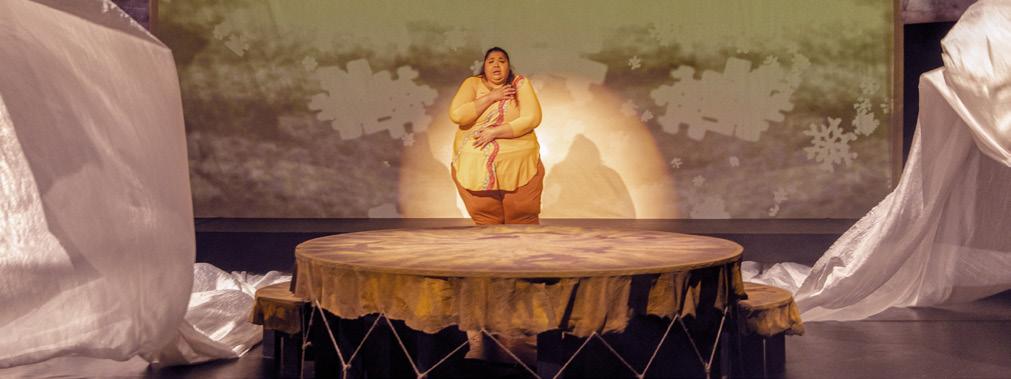
starting therapy at Anishnawbe Health started me on a journey of reclamation and knowledge gathering and remembering. I started to understand the complications and nuances of my relationship to whiteness and experiences of racism. This sort of inspired the idea of my ‘inner white girl’ and it just snowballed from there.
It was with great joy and an immense sigh of relief that we returned to live, in-person programming with our productions of Yolanda Bonnell’s White Girls in Moccasins and Justin Miller’s Distant Early Warning. As we returned to a more traditional theatrical practice, we carried forward some lessons learned about the modes in which we create. In the creation and production of these shows we strove to engage in a more humane and caring process, examining established working structures and adjusting them to care for our teams.
How did you first learn about Buddies?
A friend of mine from back home in Thunder Bay told me about it when I moved to Tkarón:to. It was the first theatre I volunteered in front-of-house for, which also meant it was the first place that I saw live theatre in the city. I volunteered that whole season until I went to theatre school. I loved it there immediately.
What inspired you to write White Girls in Moccasins?
For so many years, I was disconnected from aspects of my Anishinaabe culture and I didn’t even realize it. Until I did.

Funny enough, it was moving here that did it. Working at Native Earth Performing Arts and
How did the project evolve through the Residency Program?
Buddies was incredibly supportive during the development of the piece. I added the character of Ziibi— even if she wasn’t called that at the time—for the Rhubarb Festival while I was working with Clare Preuss. Mel and Evalyn both seemed excited by the story and really helped me lean into the levity and humor of it. The support for the workshops was incredibly helpful as it was being weaved together.
White Girls in Moccasins was one of the first shows back after the onset of the pandemic —what was that like for you?
I’ll admit it was scary at first. I’m an immunocompromised
person so being back inside a building with other people was uncomfortable. But everyone on the team was so great and diligent about being safe; consistent testing and masking indoors. We all took care of each other.
What was especially beautiful though was watching folks walk back into the theatre - for many this was their first show back. And you could see how excited they were.
What were some of your learnings from the creative process?
I think from this experience I was able to learn more about what worked and what didn’t work when approaching the process from a place of care. We know that shorter days and weeks are best. More development time and extending tech week are incredibly helpful.
I learned a lot from how Cole Alvis and Sam Brown held the space and carried a lot of those aspects forward when directing My Sister’s Rage. I brought a lot of our values and ways of working into the negotiations with Tarragon.
It was a priority for the team to be able to offer digital access to the show. Could you speak to that?
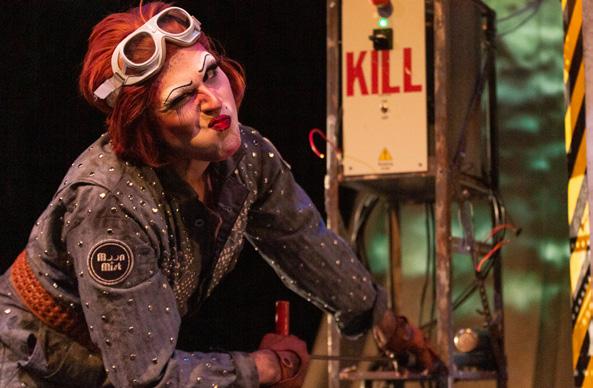
We should always be thinking about accessibility. Access. There are already so many barriers to theatre: high ticket prices, bad ramps, difficult elevator access, small seats... the list goes on. And now especially while we continue to have to exist in a pandemic, there are so many immunocompromised and/or disabled folks who aren’t able to physically attend, even with masks and vaccinations. We had so many wonderful digital offerings during the beginning of
the pandemic. I watched artists do the most creative things with online platforms. This offered so much access to folks, but as per usual, capitalism won: everyone went back to work and were told they didn’t need to wear masks and all the digital work stopped. And again, immunocompromised and/or disabled folks have been left behind or out as we so often are.
Digital options not only allow for anyone who has trouble being or is unable to be inside a theatre the ability to experience this storytelling, but it also allows for work to be seen in other communities. It offers and unlocks global access.
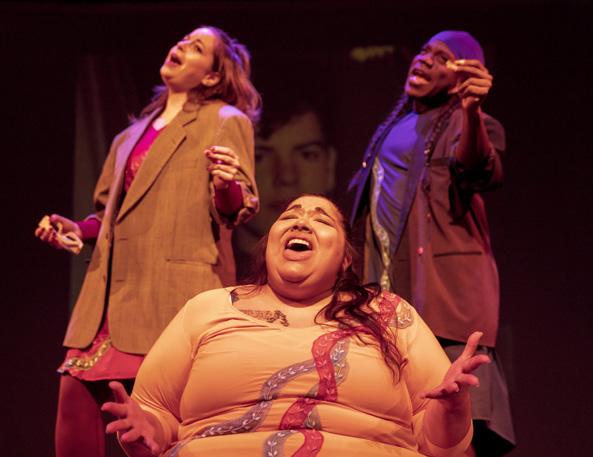
What’s next for White Girls in Moccasins, and for you?
Right now, I’m continuing to do high school workshops around the show with Studio 180 as well as some lectures. I’m hoping to go away early next year to try and write a YA novel - so that’s what’s next for me.
As for White Girls - we’ve had some folks reach out about a potential remount, so that may happen and the script is set to be published in the next year!
Tell us more about your ECU project.
Our Emerging Creators Unit fosters growth and encourages artists to engage with their practice in new and unexpected ways.
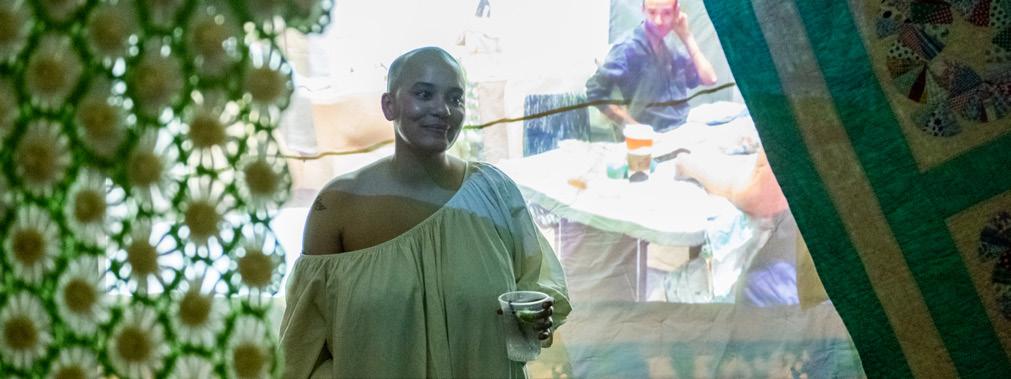
Kalale Dalton-Lutale and Tan Vu were our 2021/22 cohort, working with the creative support of Tawiah M’Carthy and Phillip Geller. They collaborated from January to June, co-developing a process of artistic creation that culminated with a public presentation as part of our Queer Pride programming, our first in–person Pride in two years.

Running alongside the ECU, our Emerging Artist and Producer Series provided opportunities for a larger group of emerging artists to connect and develop skills in art-making and producing.
How did you first get connected with Buddies?
I feel like I’ve always known about Buddies, through growing up in Toronto, through queer elders, through going to theatre school. I first got connected to Buddies through the ECU, it was when I felt like I got comfortable and connected to the physical space and the entity of the theatre. But really when I think about being ‘connected’ to Buddies, what makes me feel connected is the relationships I have built with Tawiah, Philip, and Daniel. They were integral to me feeling like I was a part of the family, feeling like I can pop in and have a chat, feeling welcome.
My project was about friendship, about my friendships with my three best friends/ chosen family. During my residency the four of us had a ‘stitch & bitch’ where we made a quilt together. None of us had ever made a quilt, which was part of the point of the project, to try something new. Together, using a medium and a craft practice that is rooted in family lineage and inheritance, we reinforced and picked apart our over 15-year bond. During our residency we documented the process through video recording. For the presentation, we hung the quilt with other textiles from my own archive, and projected a timelapse of the footage onto the quilt we made. Afterwards I got the opportunity to read a toast I wrote, for my friends, about my hopes and fears for the future.
What skills and experience are you taking away from the ECU?
I think I gained confidence in my practice, which was a goal of mine going into the unit. Before the unit I had graduated from theatre school, an experience that I felt complicated about. I
left feeling a lack of confidence in my own abilities and entire practice. When starting the ECU Philip, Taiwah and I chatted about what my goals were. I wanted to be able to run a room and feel confident articulating my ideas to collaborators and senior artists and I feel like I have gained those skills.
How did the Emerging Artist and Producer Series intersect with your time in the ECU?
EAPS intersected with the ECU in a gentle way, it allowed us to connect with other artists/ producers but did not infringe upon the time we needed. It was nice to have other artists present for the workshops that we participated in. To be honest I don’t have a ton to say about them, just that it was lovely to have a chance to hang!
What advice would you give to other emerging artists/creators who may wish to apply to ECU?
DO IT! What I really love about the ECU is the community and relationship that I know will serve me greatly in the future. I always feel like I don’t understand ‘networking’, it feels unnatural to me but what I realized after participating in the ECU was that I got to meet so many folks who
work in the community and build genuine connections to them. I do feel like I have a substantial network that I have built, as well as a solid relationship with a fantastic theatre company in Toronto.
How has working with Buddies influenced your artistic practice?
I think care is so centered in artistic practice at Buddies. I have felt so deeply cared for, I have seen the care in the planning and the care given to any artist that is in the space. This is something I will take with me and an ethic that has influenced my practice.
What’s next for you as a creator?
BIG THINGS (hopefully). I have some things cooking, but I’m superstitious so I like to keep my cards close to the chest. But making work, supporting work, and hopefully being back at Buddies VERY soon!

This season, we provided support to 10 emerging artists through the Buddies Queer Emerging Artist Award, a nostrings $1000 prize and a $500 stipend to be spent on professional development. The award has been expanded in recent years to reach more artists across disciplines.
“Winning the Queer Emerging Artist Award was significant to me because it wasn’t just about winning an award, it was about being recognized within the community and validated as an artist. I have struggled for years around allowing myself to feel like an artist and to use that word as a title. Through a great deal of practice, experimentation, and validation like the Queer Emerging Artist Award, I proudly call myself an artist. I used the stipend to pay for access to mental health therapy for self-care and self-love, two things I consider to be part of an artistic practice.”
– Ashley T., Multidisciplinary artist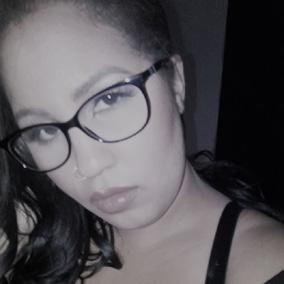
In May 2020, an important call-in was led by community members Shaista Latif, Sedina Fiati and Claire Burns encouraging the community to ask Buddies in Bad Times to acknowledge, document, reflect, and reconcile past harms and inequities at the company.
We have been doing this. We made time to step back, listen, reflect, pivot and focus on institutional learning and implementing change. Accepting the responsibility to do better and to lead by example, staff continue to devote significant time to do the work of learning and unlearning as a team. We acknowledge that systems change is not done overnight; to be innovative and progressive requires ongoing practice and imagining.
In early 2021 some senior staff and the previous Board left the Company owing to differences in strategy for moving forward. While unanticipated, sometimes ruptures are necessary, and ultimately, healthy for continued growth. We thank the previous staff and Board members for their contributions and for helping to make Buddies what it is and will be.
The ongoing work towards organizational change includes the formation of a Third-Party Review Committee, led by Shaista Latif and Sedina Fiati alongside Buddies staff and board members. They are currently conceiving key elements in helping the community and the company make changes that will better protect marginalized and precarious workers in the arts industry, and planning for community gatherings around these topics.
Quarterly company training sessions continue, focusing on antiracism and anti-oppression and skills-building to reflect community needs.
Finally, new funding has been secured to reimagine governance, leadership structures and organizational processes to be more adaptive to change and pro-active about community needs. This work has fed into a search for new organizational leadership, launched in early 2023.
For more regarding these shifts in structure, governance, and human resources, and a community Q&A, visit: buddiesinbadtimes.com/organizational-change
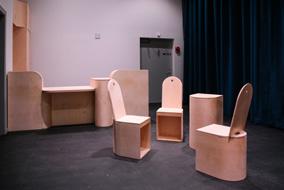
Thanks to a $150 000 contribution from the Ontario Trillium Foundation’s Resilient Communities Fund, we were able to complete some major renovations to our antechamber space. As COVID shuttered queer spaces and businesses across the city, the need to maintain and improve queer gathering spaces, both in person and online, has become more apparent.
In conversation with community members, architectural upgrades included new modular furniture designed by SHEEEP studio, accessible doors, and additional soundproofing. This work has created a more accessible space that will allow Buddies to continue to be a site of innovation, connection, and creativity—serving as a lobby, bar overflow, art gallery, rehearsal space, recording studio, relaxed space, and more.
In addition, new recording and livestreaming equipment allowed us to broaden our reach to isolated queer audience members, with programming including Queer, Far, Wherever You Are series, and a digital broadcast of Yolanda Bonnell’s White Girls in Moccasins.
REVENUES - $1,808,838
EXPENSES - $1,922,897
As we re-opened our space to the public last season, our expenditures increased, as staff, artists, and patrons returned to the space through various stages of the pandemic. Key revenue streams, such as fundraising and bar and ticket sales, were naturally slower to return. Our 2021/2022 season ended with a small deficit of $114,059.
Throughout the season our priority was on better supporting staff and artists—offering more space to residency artists, scheduling longer rehearsal periods (with shorter days), and adjusting salaries to reflect industry and cost of living standards.
Overall, the organization stands in a strong financial position, with net assets of $961,523. Of these assets, $677, 748 are unrestricted but have been earmarked for the 2022/23 season to support two international tours, alongside a fulsome reopening of our theatre. We expect to see this figure decrease substantially to show a more modest accumulated surplus moving into the 2023/24 season.
As we approach our 45th anniversary season in 2023/24, we continue to strive to better support queer artists and communities in all that we do, and the ongoing support and dedication of our audiences, volunteers, donors, and sponsors remains vital to our seeing this through.
For our full audited financial statements, visit:
buddiesinbadtimes.com/annualreport
LEGACY CIRCLE
Ed Cabell & Roy Forrester
John Alan Lee
Russell Mathew & Scott Ferguson
Richard McLellan
Adam Morrison & James Owen
Jim Robertson & Jim
Scott
VISIONARIES
$5000+
The Estate of Kenneth Dawe
Jim Lawrence & David Salak
HEROES
$2500-$4999
Paul Butler & Chris Black
Gordon/Smith
Charitable Giving Fund
Martha LA McCain
NIgE Gough Shine On Foundation
LEADERS
$1000-$2499
Altas Corporation
Lawrence Bennett
The Bulmash-Siegel Private Foundation
Entertainment Partners Canada Inc
Andrew Gillespie
Paul Hartwick
William Hodge & Robert Wylie
Elizabeth Pasternak & Alon Nashman
Brian Sambourne
Pia Schmidt-Hansen & Alicia Wesolowski
Peter Taylor
The Wine Butler
ADVOCATES
$480-$999
D. Arcand & A. Karmali
Ken Aucoin & Gerald Crowell
Neil Betteridge
Kate Bishop & Doug Gerhart
Kelly Clipperton
Robert G. Coates
Philip Doiron
Dennis Findlay
Charlie & Lulu
Franklin Foundation
George Grant
Smokestack Studio
Tim Jones & Taylor
Raths
Montana Kimel
Jim Lawrence
Richard McLellan
Lis Sparks
J.R.Tennyson
Brian Terry
Michael David Trent
The Mehta Rahim Foundation
Lucinda Wallace & Lesley Fraser
PARTNERS
$240-$479
Mark Aikman & Gustavo Cerquera Benjumea
Cole Alvis - in Honour of René Highway
Jason Aviss & Jordaan Mason
Lawrence Campbell
Shawn Daudlin
Emily Jean Derr
Alan Dingle
Robin Gordon
Tucker Gordon
Ken Harvey
Jaigris Hodson Dr. Ben Louie
Manulife Financial
Gilles Marchildon
Aidan Morishita-Miki
Edward Nowina
Oldfield Management Inc.
Wes D. Pearce
Jackie “Ma” Raposo
Andrea Ridgley
Dave Steinberg
Lionel Tona
FRIENDS
$25-$239
Christine Adam
Alba Agosto
Tina Agrell
Stephen Akuffo
Stephane Attal
Abbas Azadian
Michel Beauvais
Katherine Belanger
Michelle Bellstedt
Alexandra Berry
Angelika Betzold
Mariana Bianchini
Simon Black
Marusya Bociurkiw
Craig Bondy
Allen Braude
Mark Brodsky
Suzanne Brunelle
Hamish Buchanan
Evan Buliung
Tracy Burke
Naomi Campbell
Daniel Carter
Herng Yi Cheng
M Clarke
Russell Connelly
Kim Cousins
David Couture
In loving memory of Jonathan Crombie
Rose Cromie
Lisa Cunningham
Javier Davila
James Davis
Marlene Degenova
Ivy Del Rosario
Asha Diaz
Carol Dilworth
Janice Doherty
Angela Donnelly
Tanya Doroslovac
Michel D’Orsonnens
Joanna Drummond
Jennifer Duffy
Eva Dusome
Julia Evans
Lois Fine
Barbara Fingerote
Philip Furgiuele
Kate Garand
Linda Gardiner
Sarah Gayman
Kat Germain
Charles Gibbs
Jameson Glas
Tyler Gledhill
Danny Glenwright
Elizabeth Gray
Rod Green
John Gross
John Hagan
Jeffrey Hammond
breadART Toronto
Deborah Harding
Srosh Hassan
Heidi Hay
Raymond Helkio
Allen Hernandez
Julie Hewitt
Amanda Hollingworth
Gary Hood
Andrea Houston
Brendan Howlett
Jennifer Hunter
Daria Ilkina
Kishwar Iqbal
Carlo Isola
Kent James
Tammi Jamison
Amreetha Jayathilake
Mark Johnston
Michael Johnston
Martin Julien
Calvin K
Maureen Kado
Tom Keogh & Paul
McClure
Qasim Khan
Jeffrey King
Alison Kirby
Deanna Koitsan
Kim Koyama
Gillian Kranias
Emily Kulasa
Chanti Laliberte
Shawn Lall
Robert Laszkiewicz
Lee Leblanc
Matt Lemche
Kristina Lemieux
Field Liberty
Lily Librach
Zackey Lime
Cass Iacovelli
Jonathan MacArthur
Maddy MacDonald
Cameron MacKenzie
Cameron MacLeod
Tanya Marquardt
Desmond Marryshow
Larry Martyniuk
Jennifer Mauro
Megan McGinnisDunphy
Mandy McNeil & Beck
McNeil
Jordan Merkur
Yago Mesquita
Marc Michell
Linda Middaugh
Rebecca Moershel
Adrian Molder
Rose Morgan
Bernadette & Gene
Morishita-Miki
Lucianne Morra
Kurt Mungal
Lauren Munn
Thompson Nguyen
Damara Nickerson
Dale Northcote
Lisa Oki
Kristen Padayas
Sonia Pahwa
Keshia Palm
Adam P
Martin Pilon
Rui Pires
Russell Powell
Jim Pringle
Gyllian Raby
Elvina Raharja
Russell Ramos
Ingrid Randoja
Linda Rawlins
Illahi Rayani
Rob Reardon
Susanna Reid
Sue Rice
Brian Rieper
Stuart Rogers
Lea Rossiter
Tanveer Rouf
Erik Rozenski
Matthew Ruten
Mitsuko Sada
Paolo Santalucia
Ana Sasic
Adam Seelig
Karen Seidel
Frances Shakov
Amanda Shymko
Pierre Simpson
Chad Skinner
Jamie Slater
In memory of Gregory
Williams
DM St Bernard
Bana Stegu
Robert Stenekes
Jini Stolk
Adam Szigeti
Patricia Tedford
Misha Teramura
Oana Toma
Louis Tsilivis
Ayse Turak
Philip Turkiewicz
Algis Valiulis
Caitlin van Der Maas
Allison Vanek
Peter Bruce Walker
Caren Weisbart
Feliks Welfeld
Susan Wells
Aviva West
Mary Kate Whibbs
Adam White
Jennifer Wilshire
Jonathan Wilson
Cathrin Winkelmann
Catherine Wong
Elaine Wong
Bill & Sue Woodley
Aimee Worrell
Helen Yung
Arielle Zamora
Justina Zatzman
Garrett Zehr
Jason Zwicker
Mark Aikman & Gustavo Cerquera
Benjumea
Cole Alvis - in Honour of René Highway
Ken Aucoin & Gerald Crowell
Michel Beauvais
Marusya Bociurkiw
Allen Braude
Mark Brodsky
Herng Yi Cheng
Russell Connelly
David Couture
Shawn Daudlin
Joanna Drummond
Lo Fine
Barbara Fingerote
Danny Glenwright
Robin Gordon
Tucker Gordon
George Grant
Allen Hernandez
William Hodge & Robert Wylie
Jaigris Hodson
Andrea Houston
Daria Ilkina
Carlo Isola
Tom Keogh & Paul
McClure
Montana Kimel
Kim Koyama
Jim Lawrence & David Salak
Kristina Lemieux
Dr. Ben Louie
Jonathan MacArthur
Cameron MacLeod
Gilles Marchildon
Desmond Marryshow
Richard McLellan
Aidan
Morishita-Miki
Thompson Nguyen
Wes D. Pearce
Rui Pires
Ingrid Randoja
Susanna Reid
Andrea Ridgley
Mitsuko Sada
Jamie Slater
Peter Taylor
Lionel Tona
Louis Tsilivis
Ayse Turak
Allison Vanek
Cathrin Winkelmann
Arielle Zamora
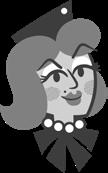


MANAGING DIRECTOR
Daniel Carter DIRECTOR OF SPECIAL PROJECTS
Jacqueline Costa
RHUBARB FESTIVAL DIRECTOR
Clayton Lee
TECHNICAL DIRECTOR
Conrad McLaren
PRODUCTION MANAGER
Rebecca Vandevelde
RENTAL + EVENTS MANAGER
steph raposo
COMMUNICATIONS + DEVELOPMENT MANAGER
Aidan Morishita-
Miki
BOX OFFICE + FRONT-OF-HOUSE MANAGER
Julia Lewis
MANAGER OF TOURING
Chris Reynolds
ARTISTIC PRODUCING INTERN
Julie Phan 潘家雯
EMERGING CREATORS UNIT DIRECTOR
Erum Khan
YOUTH/ELDERS PROGRAMMING COORDINATORS
leZlie lee kam + Usman Khan
FACILITY MANAGER
Paul Therrien
MARKETING ASSOCIATE
Natasha Ramondino
FUNDRAISING + EVENTS ASSOCIATE
Chase Hiebert
FINANCE MANAGER
Cynthia Murdy
BOX OFFICE + FRONTOF-HOUSE LEAD
Jake Ramos
COMMUNITY + EDUCATIONAL PROGRAMMING PRODUCER
Jacob Lin 林鴻恩
BOX OFFICE + FRONT-OF-HOUSE REPRESENTATIVES
Ifetayo Alabi, Yiming Cai, Sky Ffrench, Brawk Hessel, Caitlin
Kelly, Camille
Mankumah, Saskia Muller, Neta Rose, Sarah Rowe, Illianna Wotton
BAR PERSONNEL
Richard Bell, Charlee Boyes, Andrew Desabrais, Daniel Hoang, Vishmayaa Jeyamoorthy, Ronnie Légère, Daniel Rojas, Neta Rose
CREW
Matt Armour, Samira Banihashemi, Theo Belc, Luke Dobson, Mike Dowdall, Mike Grdosic, Frank Incer, Antel Kollenberg, Matt Lisk, Jasper Jacobs, Seven MacLennan-Nobrega, Sebastian Marziali, Kit Norman, River Oliveira, El Patey, Amber Pattison, Rachel Shaen, Aidan Shepherd, Zev Shoag, Diamond Srey, Katherine Teed-Arthur, Alison ThomasHall, Van Ward Board of Directors
Brendan McMurtry Howlett (CHAIR)
Christina Cicko (VICE CHAIR, SECRETARY)
Alexander Hutchison (TREASURER)
Ashley Belmer
Michael Man
Anu Radha Verma

